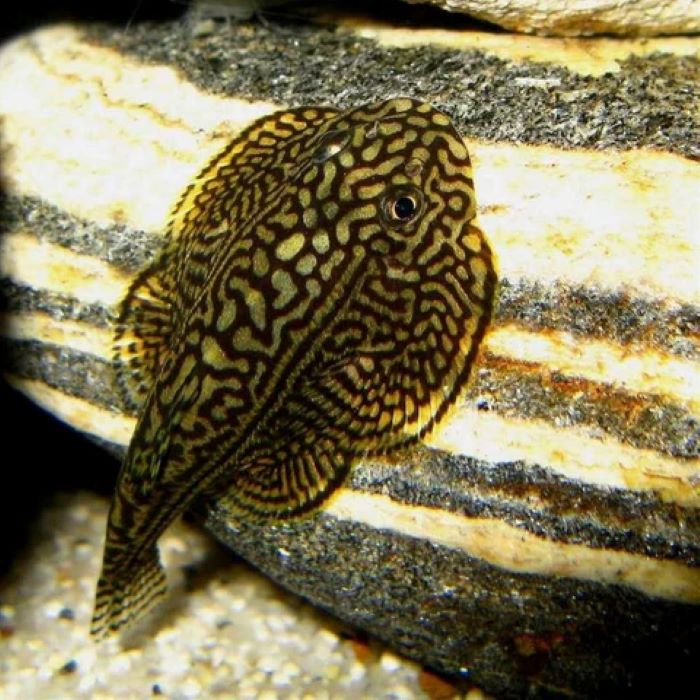As a member of the Balitoridae family, freshwater hillstream loaches are fascinating and peculiar fish known for their streamlined bodies and inclination to inhabit fast currents. Keeping a hillstream loach in an aquarium requires careful consideration of the fish’s natural habitat, habits, and requirements for nutrition and water. This comprehensive guide will cover all you need to know about hillstream loach care and aquarium setup to ensure the health and happiness of these amazing fish.
Table of Contents
Understanding Hillstream Loach Care:

Hillstream loaches thrive in the depleted, oxygenated waterways and floods of Southeast Asian countries, including China, Vietnam, and Thailand. They have adapted to life in fast water by having an adaptive body shape and a particularly flexible pelvic blade, which empowers them to cling to rocky areas with strength. To keep hillstream loaches happy, you really need to establish an environment that resembles their local natural surroundings.
Tank Size and Setup:
If you wish to keep Hillstream Loaches in an aquarium, make sure there is a ton of oxygen and a fast water flow rate. Use a tank that can hold 20 gallons of water to collect a small number of hillstream loaches. Their aquarium should closely resemble their natural setting, which is a wide, winding stream.
- Substrate: Substrate, for example, fine rock or smooth waterway rocks, will provide the best climate for mountain streams. Avoid exposing them to anything that could irritate their delicate skin.
- Water Flow: Loaches found in mountain rivers thrive in highly oxygenated, fast-flowing water. To accomplish this, you will need an aquarium water siphon or excellent powerhead to provide delicate to direct circulation throughout the tank. The siphon should be replaced so that water can flow without excessive noise.
- Temperature and Water Parameters: Maintaining water temperatures in the range of 68 and 75 °F (20 and 24 °C) will mimic the cool conditions they experience in their local environment. Hillstream loaches are mostly found in water that has a pH that is slightly acidic or somewhat alkaline, somewhere between 6.5 to 7.5. It is imperative to regularly evaluate water to maintain consistent and proper characteristics.
- Filtration: An aquarium needs a strong and effective channel to maintain the water quality at an impeccable level. For biological and mechanical filtration, you may want to consider using sponge or canister filters. Hillstream loaches are very sensitive to changes in water quality, so it is important to change the water frequently and clean the channel.
Choosing Compatible Tankmates:
Hillstream loaches aren’t usually hostile, but you should still be careful with what you keep in your tank with them. Because of their fragility, loaches should avoid species that are hostile or possessive of their territory. Tankmates that are mild-mannered and social, including danios, rasboras, and tiny catfish, get along well. Make sure that every fish in your aquarium has the same water parameter requirements for optimal health.
Diet and Feeding:
Organic matter, small invertebrates, and algae are some of the food sources for omnivore hillstream loaches. It is critical to provide a food similar to their natural one while they are in captivity to ensure their health and well-being.
- The natural biofilm that forms when surfaces such as rocks and driftwood are exposed to algae is a food source for hillstream loaches. Algae wafers and sinking pellets are also suitable for fish that live at the water’s bottom.
- Frozen and Live Foods: They can benefit from a supplement of brine prawns, bloodworms, and daphnia. These protein-rich foods help fulfil their nutritional needs.
- Hillstream loaches, like cows, need small portions of food many times a day in order to flourish. Eating food rapidly will help prevent overfeeding and contamination of the water source.
Behavior and Tank Enrichment:
One of the numerous advantages of keeping hillstream loaches is witnessing the fish’s interactions with their natural surroundings. People often describe them as being full of life and energy, always up for an adventure. Add tank enrichment to improve their health:
- Use aquatic features like tunnels, stones, and driftwood to build hiding spots for hillstream loaches. These man-made structures mimic their native environment and serve as exploration areas.
- Choose hardy, low-light plants such as Java ferns, Anubias, or moss varieties. In addition to enhancing the aesthetic value of the aquarium, they provide more surfaces for the growth of algae and biofilm.
- Make it appear like the natural streams they’re accustomed to by turning down the lights.
- Hillstream loaches will feel more at home in an aquarium with some floating plants and dim lighting.
Breeding Hillstream Loaches:
Because of their unique environmental requirements, hillstream loaches may be difficult to breed in captivity. If you’re up for it, though, here are a few considerations:
- Build a one-of-a-kind aquarium with plenty of room for substrate, hiding places, and water circulation. You want your aquarium to mimic natural habitats as closely as possible.
- As part of their conditioning, breeding pairs should be given a varied and high-quality diet that includes both live and frozen meals. They may be ready to start a family if you notice changes in their behaviour, like becoming more active and possessive of their territory.
- Before laying their eggs, hillstream loaches apply an adhesive coating to the undersides of rocks and other surfaces. Prepare the tank so they can lay their eggs in the right spots, then monitor it for any indications that they’re hatching.
- Keep the fry separate from the adults as soon as they hatch to prevent them from being preyed upon. Fry should be given infusoria, baby brine prawns, and other suitable little foods until they grow large enough to eat regular fish diet.
Common Health Issues and Treatment:
Hillstream loaches are susceptible to illness just like any other aquarium fish. Keep an eye out for any strange conduct, lack of hunger, or extreme fatigue that can point to a health problem.
- For White Spot Disease (Ich), follow the manufacturer’s instructions to the letter while administering the medication. A small increase in tank temperature can hasten the parasite’s life cycle.
- If you see any signs of fin rot, you must immediately treat the water with a broad-spectrum antibiotic and maintain ideal water conditions. Reduce the strain by addressing the root cause, such as poor water quality.
- Before introducing newly acquired fish to the main tank, it is recommended to keep them in quarantine to prevent the spread of parasites. Treat sick fish with the appropriate anti-parasitic medication.
Conclusion:
Hillstream loaches are a charming addition to any clean aquarium. If you want these remarkable freshwater fish to live long, healthy lives, you need to know and follow their natural habitat, feed them the right things, and make sure they have a fun place to play. Hillstream loaches require a balanced food, a tank in the right environment, and careful monitoring of water parameters to stay healthy. With the Hillstream Loach Care, these fascinating fish can thrive and become an attraction in your aquarium hobby.

Lena Whitmore is the lead writer at FishClans.com, bringing over 10 years of fishkeeping expertise and a master’s degree in Marine Biology to the site. Her extensive knowledge and practical tips have established her as a respected authority in the aquarist community. Lena’s work has appeared in leading publications and she frequently speaks at industry events.
Connect with Lena and FishClans on Facebook, Pinterest, and Instagram.

